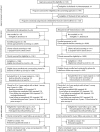Depression Remission From Community Coalitions Versus Individual Program Support for Services: Findings From Community Partners in Care, Los Angeles, California, 2010-2016
- PMID: 31242001
- PMCID: PMC6595525
- DOI: 10.2105/AJPH.2019.305082
Depression Remission From Community Coalitions Versus Individual Program Support for Services: Findings From Community Partners in Care, Los Angeles, California, 2010-2016
Abstract
Objectives. To explore effects of coalitions (Community Engagement and Planning [CEP]) versus technical assistance (Resources for Services [RS]) for depression collaborative care and the effects of social determinants on long-term remission outcomes. Methods. We randomized 95 health care and community programs in Los Angeles County, California, to CEP or RS. In 2010, 1246 depressed (Patient Health Questionnaire [PHQ-8] ≥ 10) adults enrolled and were invited for baseline and 6-, 12-, and 36-month surveys. Of 598 3-year completers, 283 participated at 4 years (2016). We examined effects of CEP versus RS, social factors (e.g., family income, food insecurity) on time to and periods in clinical (PHQ-8 < 10) and community-defined (PHQ-8 < 10 or PHQ-2 < 3; mental health composite score [MCS-12] > 40, or mental wellness) remission during the course of 3 years, and at 4 years. Results. We found that CEP versus RS increased 4-year depression remission and, for women, community-defined remission outcomes during the course of 3 years. Social factors and clinical factors predicted remission. Conclusions. At 4 years, CEP was more effective than RS at increasing depression remission. Public Health Implications. Coalitions may improve 4-year depression remission, while addressing social and clinical factors associated with depression may hold potential to enhance remission.
Figures
Similar articles
-
Community Partners in Care: 6- and 12-month Outcomes of Community Engagement versus Technical Assistance to Implement Depression Collaborative Care among Depressed Older Adults.Ethn Dis. 2018 Sep 6;28(Suppl 2):339-348. doi: 10.18865/ed.28.S2.339. eCollection 2018. Ethn Dis. 2018. PMID: 30202186 Free PMC article. Clinical Trial.
-
Comparing Long-Term Outcomes of Two Collaborative Care Approaches for People with Depression [Internet].Washington (DC): Patient-Centered Outcomes Research Institute (PCORI); 2018 Nov. Washington (DC): Patient-Centered Outcomes Research Institute (PCORI); 2018 Nov. PMID: 39133795 Free Books & Documents. Review.
-
Community-partnered cluster-randomized comparative effectiveness trial of community engagement and planning or resources for services to address depression disparities.J Gen Intern Med. 2013 Oct;28(10):1268-78. doi: 10.1007/s11606-013-2484-3. Epub 2013 May 7. J Gen Intern Med. 2013. PMID: 23649787 Free PMC article. Clinical Trial.
-
Improving Depression Care for Adults With Serious Mental Illness in Underresourced Areas: Community Coalitions Versus Technical Support.Psychiatr Serv. 2018 Feb 1;69(2):195-203. doi: 10.1176/appi.ps.201600514. Epub 2017 Oct 16. Psychiatr Serv. 2018. PMID: 29032700 Free PMC article. Clinical Trial.
-
Systematic reviews of the effectiveness of day care for people with severe mental disorders: (1) acute day hospital versus admission; (2) vocational rehabilitation; (3) day hospital versus outpatient care.Health Technol Assess. 2001;5(21):1-75. doi: 10.3310/hta5210. Health Technol Assess. 2001. PMID: 11532238 Review.
Cited by
-
Applying Community-Partnered Participatory Research Approaches to Develop COVID-19 Solutions.Ethn Dis. 2020 Jul 9;30(3):433-436. doi: 10.18865/ed.30.3.433. eCollection 2020 Summer. Ethn Dis. 2020. PMID: 32742147 Free PMC article. No abstract available.
-
Resilience Against Depression Disparities (RADD): a protocol for a randomised comparative effectiveness trial for depression among predominantly low-income, racial/ethnic, sexual and gender minorities.BMJ Open. 2019 Oct 22;9(10):e031099. doi: 10.1136/bmjopen-2019-031099. BMJ Open. 2019. PMID: 31641001 Free PMC article. Clinical Trial.
-
Life Events, Barriers to Care, and Outcomes Among Minority Women Experiencing Depression: A Longitudinal, Mixed-Method Examination.J Nerv Ment Dis. 2022 Aug 1;210(8):596-606. doi: 10.1097/NMD.0000000000001496. Epub 2022 Feb 21. J Nerv Ment Dis. 2022. PMID: 35184128 Free PMC article.
-
A Rapid Assessment of Disaster Preparedness Needs and Resources during the COVID-19 Pandemic.Int J Environ Res Public Health. 2021 Jan 7;18(2):425. doi: 10.3390/ijerph18020425. Int J Environ Res Public Health. 2021. PMID: 33430355 Free PMC article.
-
Comorbid anxiety, loneliness, and chronic pain as predictors of intervention outcomes for subclinical depressive symptoms in older adults: evidence from a large community-based study in Hong Kong.BMC Psychiatry. 2024 Nov 21;24(1):839. doi: 10.1186/s12888-024-06281-2. BMC Psychiatry. 2024. PMID: 39574082 Free PMC article. Clinical Trial.
References
-
- Friedrich MJ. Depression is the leading cause of disability around the world. JAMA. 2017;317(15):1517. - PubMed
-
- Miranda J, McGuire T, Williams D, Wang P. Mental health in the context of health disparities. Am J Psychiatry. 2008;165(9):1102–1108. - PubMed
-
- Silva M, Loureiro A, Cardoso G. Social determinants of mental health: a review of the evidence. Eur J Psychiatry. 2016;30(4):259–292.
-
- Thota AB, Sipe TA, Byard GJ et al. Collaborative care to improve the management of depressive disorders: a community guide systematic review and meta-analysis. Am J Prev Med. 2012;42(5):525–538. - PubMed
-
- Miranda J, Chung JY, Green BL et al. Treating depression in predominantly low-income young minority women: a randomized controlled trial. JAMA. 2003;290(1):57–65. - PubMed
Publication types
MeSH terms
Grants and funding
LinkOut - more resources
Full Text Sources
Medical


